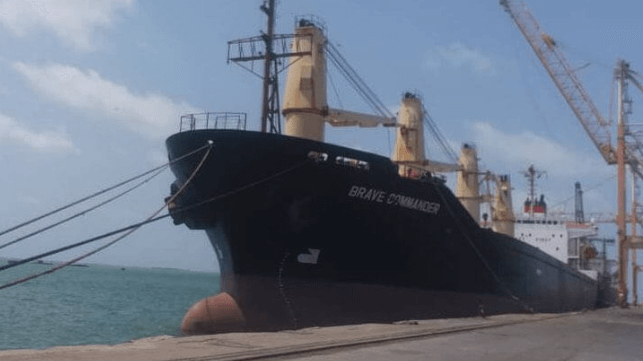Kuwaiti Admiral Takes the Helm at the UN Black Sea Grain Initiative

The Black Sea Grain Initiative was "a highlight of UN diplomacy" in 2022. In late July, with encouragement from the United Nations and the government of Turkey, Russia agreed to allow a limited number of cargo ships to transit to and from select Ukrainian seaports to load grain cargoes. It has been a partial success: In total, some 600-plus vessels carried 16 million tonnes of Ukrainian corn, wheat, sunflower seeds and other products to global markets in the second half of the year.
The deal saw the establishment of a coordination center in Istanbul, staffed with representatives from Ukraine, Russia, Turkey and the UN, to monitor the loading of grain at three seaports on Ukraine's Black Sea coast. During the transit in and out, Ukrainian pilots guide the ships along a designated corridor, avoiding mined areas. They are inspected on entry and again at exit.
The program's implementation was overseen by Amir Mahmoud Abdulla, the longtime Deputy Executive Director of the UN World Food Programme. Among other roles in his 31 years at WFP, Abdulla oversaw the agency's emergency operations, supply chain operations and security divisions.
Last week, United Nations Secretary-General António Guterres announced that the next coordinator for the initiative will be Vice Adm. Abdullah Abdul Samad Dashti (ret'd), a veteran of the Kuwaiti Navy and a longtime director at Kuwait's joint command and staff college. Dashti has also served as the rotating commander of Combined Task Force 152 (CTF 152) and as deputy flotilla commander for the Kuwaiti Navy, among other roles.
"The Secretary-General is grateful for Mr. Abdulla’s leadership, hard work and commitment in implementing the Initiative, including in challenging times," the UN said in a statement.
Vice Adm. Dashti has a challenging brief ahead: Though the initiative has reopened the seaborne export route that Russia closed in February 2022, it still has a long way to go to restore normalcy for Black Sea shipping. Two key Ukrainian ports, Mykolaiv and Kherson, are still barred from access. In addition, Russia has restricted the number of search teams assigned to the task of entry and exit inspections in Istanbul, leading to a backlog for inbound and outbound vessels.

that matters most
Get the latest maritime news delivered to your inbox daily.
With Russia's participation, the program has been clearing as few as one outbound ship per day, and rarely more than five. When Moscow briefly quit the initiative in October, the other parties worked together to inspect and clear about 40 ships per day.
The program is also up for renewal every 120 days, and the last round - concluded on November 17 - saw significant resistance from Russia. In addition, there is a new commercial challenge: Western reinsurers are now reluctant to underwrite war risk coverage for Russian and Ukrainian waters, creating new complications for shipowners operating on the route.
